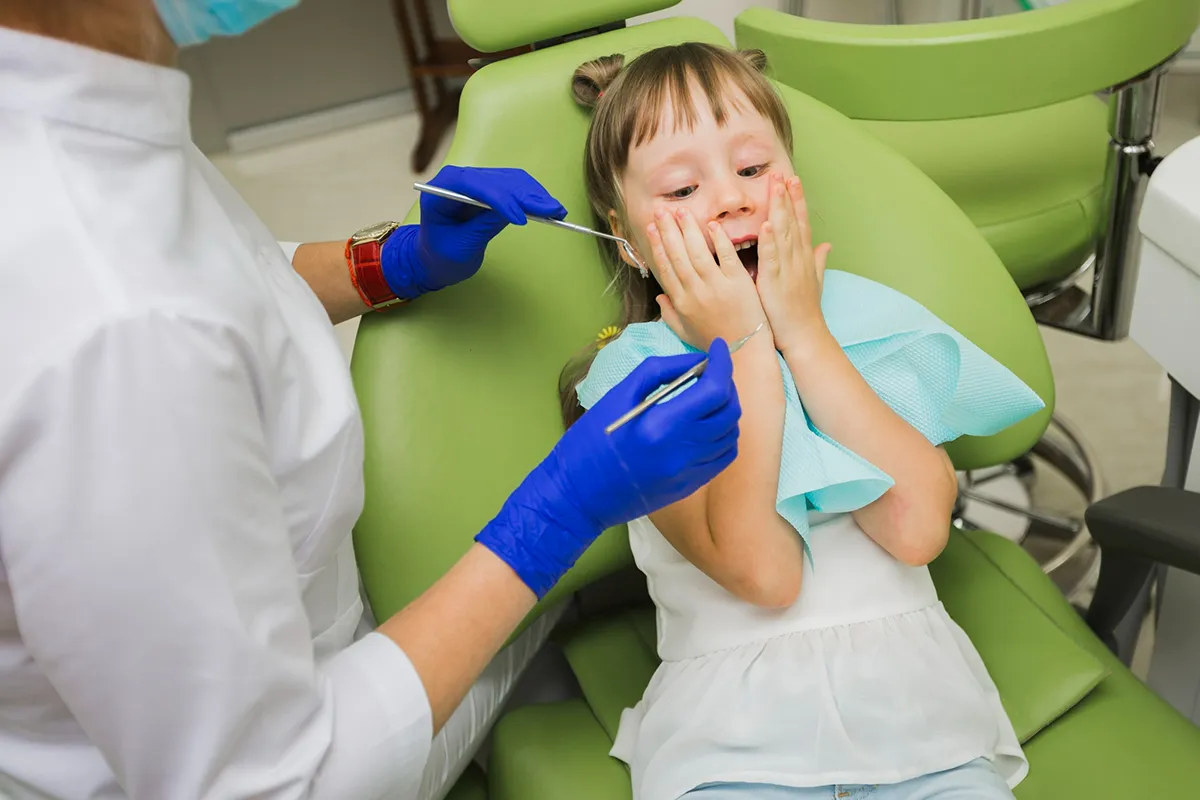Importance of Fluoride for Children’s Teeth
Fluoride is a powerful ally in the fight against tooth decay and promoting optimal dental health for children. The importance of fluoride in protecting and preserving the dental health of children’s teeth holds immense significance. Through enamel strengthening, cavity prevention, and support for proper tooth development, fluoride proves its significance repeatedly.
To prioritize their children’s oral care, parents and caregivers should incorporate fluoride into their routine by ensuring access to fluoridated water and fluoride toothpaste and consulting dental professionals for fluoride treatments. By embracing the importance of fluoride, we can give our children a strong foundation for a lifetime of healthy smiles and overall well-being.
This blog aims to highlight the significance of fluoride and provide a thorough understanding of its role in dental health. The knowledge shared here will empower you to make well-informed decisions concerning your child’s oral health and ensure he receives optimal dental care. Let’s begin exploring the subject.
Understanding the Role of Fluoride in Dental Health
Fluoride helps in maintaining optimal dental health, particularly in children. This naturally occurring mineral has gained recognition for its remarkable ability to safeguard teeth against decay. When children ingest fluoride or use fluoride-based dental products, it interacts with the tooth enamel, strengthening it and enhancing its resilience against acid attacks from bacteria and sugary substances.
The process of remineralization, wherein fluoride helps replenish lost minerals in the enamel, contributes to its increased strength and reduced susceptibility to decay. Additionally, fluoride also acts as an inhibitor, limiting the growth of harmful bacteria and minimizing dental caries risk.
“Regular exposure to fluoride, through toothpaste, fluoridated water, or dental treatments, can significantly reduce the risk of dental caries in children.”
Why Fluoride Matters for Children’s Teeth?
Fluoride is particularly vital for children’s teeth due to several reasons. First and foremost, children’s teeth are in a developmental phase. As their permanent teeth form beneath the gums, fluoride aids in mineralization, ensuring the teeth grow strong and healthy. Ensuring sufficient fluoride intake during this crucial stage can have long-term effects on children’s oral health that extend throughout their lives.
It’s important to note that children are more susceptible to tooth decay than adults. Their enamel is still developing and porous, making them more vulnerable to acid attacks. Furthermore, children tend to have less refined oral hygiene habits, including brushing and flossing, which can leave their teeth susceptible to decay. Fluoride is a powerful ally, providing an extra layer of defense against cavities and maintaining dental health.
What are the Benefits of Fluoride?
Research has shown that communities with access to fluoridated water have significantly lower rates of dental caries. Fluoride strengthens the enamel, making it harder for acids to penetrate and cause damage. It acts as a protective shield for children’s teeth, reducing the risk of cavities and ensuring their smiles stay healthy and bright.
Moreover, fluoride is not limited to water alone. Fluoride toothpaste, mouth rinses, and professional fluoride treatments at the dentist’s office are all effective ways to deliver fluoride to children’s teeth. When used correctly and in appropriate amounts, these fluoride sources can provide targeted protection and promote optimal oral health.
How Fluoride Strengthens and Protects Children’s Teeth?

Fluoride works wonders in strengthening and protecting children’s teeth. When children consume fluoridated water or use fluoride toothpaste, the enamel absorbs the fluoride ions, helping to rebuild and fortify its structure. The process of remineralization, facilitated by fluoride, helps replenish lost minerals in the enamel and enhances its resistance to acid attacks.
Additionally, fluoride plays a role in interrupting the demineralization process, which involves the dissolution of minerals from the enamel by acids. By suppressing the growth of bacteria that produce damaging acids, fluoride contributes to a balanced oral environment, effectively preventing the formation of cavities.
While fluoride is highly beneficial, proper dosage is vital. Children should use fluoride dental products under the guidance of parents and dental professionals to ensure they receive the appropriate amount of fluoride for their age and risk level. By doing so, parents can harness the remarkable strength of fluoride to safeguard their children’s teeth and set them on a path to a lifetime of good oral health.
The Role of Fluoride in Preventive Dental Care for Children
Incorporating fluoride into the dental care routine ensures that children have the best possible protection against tooth decay, promoting healthy smiles and a lifetime of optimal oral health.
- Strengthening Tooth Enamel: Fluoride is known for its ability to strengthen tooth enamel, which is the protective outer layer of the teeth. It actively enhances the remineralization process, allowing the absorption of minerals like calcium and phosphate into the enamel, strengthening it, and increasing its resistance to acid attacks caused by bacteria and sugars.
- Preventing Tooth Decay: Fluoride helps combat tooth decay by curbing the growth of bacteria that produce harmful acids. It also aids in remineralizing early stages of decay, effectively reversing the process and preventing further damage.
- Supporting Proper Tooth Development: Fluoride is essential for keeping proper tooth development in children. It ensures that developing teeth receive the necessary minerals, enabling healthy enamel formation.
Sources of Fluoride
- Fluoridated Water: Drinking fluoridated water helps strengthen tooth enamel and prevent tooth decay. Check with local authorities or water providers to determine the fluoride levels in your tap water. If the fluoride concentration falls below the optimal range, consider alternative sources.
- Fluoride Toothpaste: Fluoride toothpaste formulated specifically for children is an essential source of fluoride. When selecting a toothpaste, look for the American Dental Association (ADA) seal of acceptance to ensure its efficacy and safety.

- Fluoride Mouth Rinse: Fluoride mouth rinses are another source of fluoride that can provide an extra layer of protection against tooth decay. However, it is essential to note that not all children may require or benefit from using a fluoride mouth rinse. Dentists or professionals can determine if a child would benefit from a mouth rinse and recommend the appropriate product and usage instructions.
- Professional Fluoride Treatments: Dental professionals may offer professional fluoride treatments during routine check-ups. These treatments involve the application of a higher concentration of fluoride, often in the form of a gel, foam, or varnish, directly to the teeth. Professional fluoride treatments provide targeted protection and can be particularly beneficial for children at higher risk of tooth decay or those with specific dental needs. The frequency of professional fluoride treatments will vary based on individual circumstances, and dentists can advise on the appropriate schedule.
How Much Fluoride is Beneficial for Children?
The optimal percentage of fluoride for children varies based on age and tooth decay risk. The recommended fluoride concentration in drinking water and dental products, such as toothpaste, is determined by dental authorities and health organizations. Here are the general guidelines:
- Fluoridated Water: In many countries, the recommended optimal level of fluoride in community water fluoridation ranges between 0.7 to 1.2 parts per million (ppm). This level is considered safe and effective in preventing tooth decay without posing any significant risk of dental fluorosis.
- Fluoride Toothpaste: A smear of fluoride toothpaste containing no less than 1,000 ppm is enough for children younger than three. Using only a pea-sized amount of toothpaste is best to prevent excessive ingestion.
- Fluoride Mouth Rinse: Fluoride mouth rinses typically contain a higher concentration of fluoride, usually around 0.05% sodium fluoride. However, using fluoride mouth rinses for children should be done under the guidance and recommendation of a dental professional.
Thoughts
Fluoride plays a critical role in preventive dental care for children, serving as a powerful tool in maintaining their oral health and protecting their teeth from decay. Parents can actively safeguard their children’s oral health by strengthening tooth enamel, preventing tooth decay, supporting proper tooth development, and utilizing targeted fluoride sources.
While fluoride is beneficial for dental health, it’s important to use fluoride products in the appropriate amounts to avoid dental fluorosis (a condition known as hypo mineralization).
Contact Stockton dentist for kids, Sajjad Rizvi DDS, at Happy Kids Dental today to know more about the Importance of Fluoride for Children’s Teeth.
Resource:
Common Pediatric Dental Procedures: Understanding the Basics
*This media/content or any other on this website does not prescribe, recommend, or prevent any treatment or procedure. Therefore, we highly recommend that you get the advice of a qualified dentist or other medical practitioners regarding your specific dental condition*
Subscribe To Our Newsletter
Get Updates And Learn From The Best


